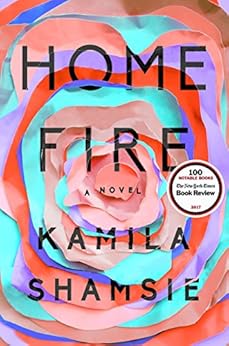 This book
was longlisted for the 2017 Man Booker Prize and recently appeared on the
longlist of the 2018 Women’s Prize for Fiction.
I understand why it was so honoured.
This book
was longlisted for the 2017 Man Booker Prize and recently appeared on the
longlist of the 2018 Women’s Prize for Fiction.
I understand why it was so honoured.
Isma Pasha,
a Pakistani-Brit, goes to the United States to work on a PhD, leaving behind her
siblings in London. Nineteen-year-old Aneeka is studying law but her twin brother
Parvaiz ends up recruited by ISIS. Shortly
after leaving the country to join the terrorist group, he realizes he has made
a mistake and wants to come home. Though
the British home secretary, Karamat Lone, has revoked the citizenship of all
nationals who have left Britain to join a terrorist group, Aneeka sets out to
bring home her brother, even starting a relationship with Eamonn Lone, the son
of the British home secretary.
The book is
divided into five sections; each gives the point of view of a different
character: Isma, Eamonn, Parvaiz,
Aneeka, and Karamat. This structure
allows the reader to get to know each of the main characters and to understand
his/her motives.
The book
examines the difficulties of being a Muslim in a hostile world. Isma knows not to pack a Quran and is not surprised
to be interrogated for nearly two hours before her flight to the U.S.: “[The interrogating officer] wanted to know
her thoughts on Shias, homosexuals, the Queen, democracy, The Great British Bake Off, the invasion of Iraq, Israel, suicide
bombers, dating websites.” Aneeka’s
cousin in Pakistan outlines the tenuous situation of Muslims: “’My sister lives in America, she’s about to
have a child there – did you or your bhenchod brother stop to think about those
of us with passports that look like toilet paper to the rest of the world who spend
our whole lives being so careful we don’t give anyone a reason to reject our
visa application? Don’t stand next to
this guy, don’t follow that guy on Twitter, don’t download that Noam Chomsky
book. And then your brother uses us as a
cover to join some psycho killers . . . ’”
Of course, the Pasha family’s lives are complicated by the fact that
their father was a jihadist.
Parvaiz’s
drift towards ISIS is well-depicted. He
is a young man haunted by the memory of the father he never really knew. Adil Pasha, who had fought in Kashmir,
Chechnya, Kosovo and Afghanistan, died enroute to Guantánamo after
being tortured in an internment facility in Bagram, Afghanistan. His father was never mentioned in his
home: “secrecy had lived inside the
house too. His mother and Isma both
carried an anger toward Adil Pasha too immense for words.” Adil’s reputation as a fighter is used to
lure Parvaiz into the group; one of the reasons he joins is that he is promised
he will be able to meet men who knew his father. Parvaiz is not demonized; he is portrayed as
a misguided youth whose life seems rather aimless and who falls prey to an
experienced recruiter.
Sympathy is
aroused for each of the characters. Each
makes some questionable choices but for perfectly understandable reasons. A sister informs authorities of her brother’s
joining terrorists which she views as “enemies of both Britain and Islam” but in
so doing she can be seen as disloyal to her family. A politician focuses on the country’s
security by not allowing the return of would-be terrorists, but he turns his
back on his background and faith. Characters
are put in positions where they must answer, “What would you stop at to help
the people you love most?” Complex
issues are examined and the solutions are not easy.
There are
scenes in this novel which are anything but forgettable, the conclusion being
the most memorable. It has been pointed
out that the book is a contemporary re-imagining of Sophocles’ Antigone; the author quotes the play in
her epigraph: “The ones we love . . .
are enemies of the state.” A knowledge
of the Greek tragedy, however, is not required.
The book will not leave the reader unaffected.
No comments:
Post a Comment